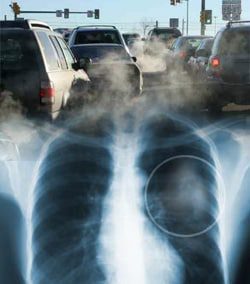
A cancer group just announced that diesel exhaust can cause lung cancer. The respected International Agency for Research on Cancer (IARC) is part of the World Health Organization (WHO). IARC does not have rule-setting or enforcement power; however, governments tend to look to the IARC for guidance, said CNN, which could, in turn pressure governments […]
 A cancer group just announced that diesel exhaust can cause lung cancer. The respected International Agency for Research on Cancer (IARC) is part of the World Health Organization (WHO).
A cancer group just announced that diesel exhaust can cause lung cancer. The respected International Agency for Research on Cancer (IARC) is part of the World Health Organization (WHO).
IARC does not have rule-setting or enforcement power; however, governments tend to look to the IARC for guidance, said CNN, which could, in turn pressure governments to install stricter emissions guidelines and also protect workers exposed to diesel exhaust. IARC has classified diesel engine exhaust as a “probable” carcinogen for over 20 years. Until now, said CNN, no clear proof linked the fumes to increased cancer rates.
Two studies were recently published that involved research on more than 12,000 mine workers. The studies were conducted by the National Cancer Institute and the National Institute for Occupational Safety and Health, and were known as the Diesel Exhaust in Miners Study (DEMS), said CNN. Both studies found an increase in lung cancer rates in workers exposed to diesel exhaust underground. Greater exposure was also linked to steadily increased cancer rates. CNN explained that one study found that workers with the highest exposure experienced a three-fold risk of death; the other study revealed a five-fold increased risk. Even low levels of exposure to the suspected carcinogen elevated the risk of lung cancer by 50 percent, the study noted.
While IARC does not make policy recommendations, Dr. Kurt Straif, head of the classification program, warned that diesel dangers may not only impact mine workers. “We have learned from other carcinogens, such as radon, that initial studies showing a risk in heavily exposed occupational groups were followed by positive findings for the general population. Therefore, actions to reduce exposures should encompass workers and the general population,” Dr. Straif told CNN.
In a polluted city, cancer risks might be low individually, “but if you’ve got a ubiquitous exposure such as diesel engine exhaust, then it could make an awful lot of people ill,” said Lesley Rushton, a biostatistician at Imperial College London. Rushton wrote an editorial in the Journal of the National Cancer Institute this year urging “stringent” standards for occupational and environmental exposure, said CNN. Rushton noted that the health risk is not limited to cancer. Asthmatics, for instance, experienced reduced lung function after just walking for two hours down a London street that was heavily trafficked by diesel-powered vehicles, explained CNN.
The use of diesel fuel has also entered the controversies surrounding hydraulic fracturing (fracking) drilling. Diesel fuel is one of the 60 or more known toxins used in the fracking process, although most wells can employ diesel without having to disclose as much.
Last year, we wrote that research—conducted by the University of Edinburgh and published in the European Heart Journal—found that ultrafine diesel exhaust particles, released by exhaust fumes, could increase one’s likelihood for heart attacks. When diesel burns, it becomes harmful to blood vessels, increasing the risks for blood clots in the arteries, which can lead to a heart attack or stroke.
Scientists have also long known that diesel fumes might play a role in the development of lung cancer. Diesel fumes consist of a toxic stew of about 400 chemicals, including benzene, formaldehyde, arsenic, cyanide, and lead. Breathing large amounts of diesel fumes could cause respiratory diseases, and people with asthma, heart disease, and emphysema can experience a worsening of symptoms if exposed to the exhaust. In addition to lung cancer, long-term exposure can lead to chronic obstructive lung disease.
We also previously wrote that prior research suggested that lung cancer risks are higher among trucking industry workers because of diesel fume exposure. According to a study published the journal Environmental Health Perspectives, workers in the trucking industry with an estimated 20 years on the job have an elevated risk of lung cancer with each increasing year of work due to their diesel fume exposure.


